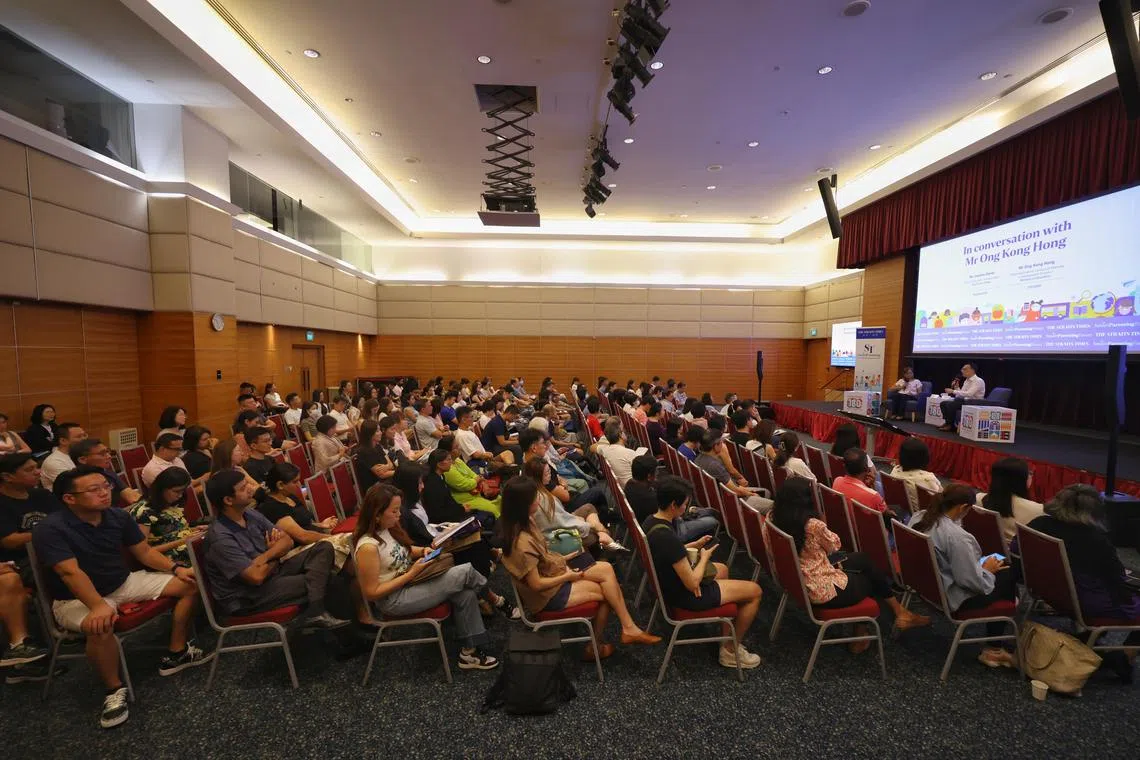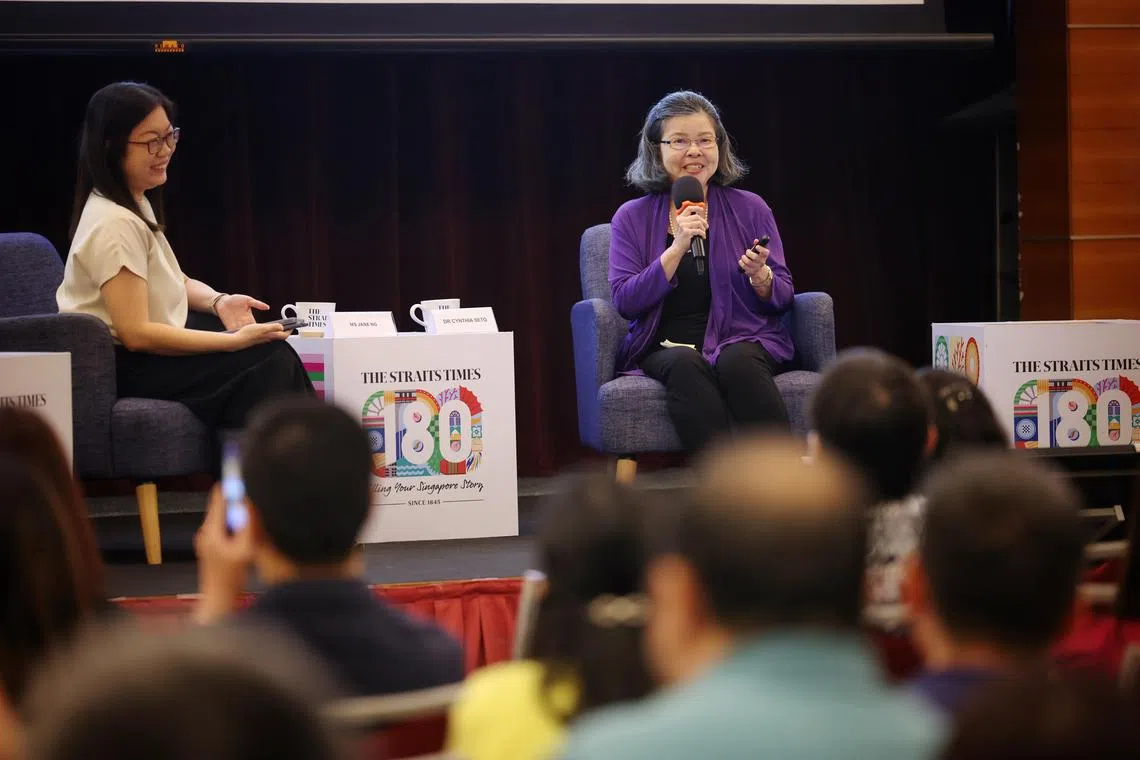ST PSLE prep forum: School is enough to prepare your child for PSLE
Sign up now: Get ST's newsletters delivered to your inbox

ST senior education correspondent Sandra Davie and Mr Ong Kong Hong, MOE’s divisional director of curriculum planning and development division 1, at The Straits Times Smart Parenting PSLE Prep Forum on April 12.
ST PHOTO: JASON QUAH
Follow topic:
SINGAPORE – Is the curriculum covered in primary school enough to prepare pupils for the Primary School Leaving Examination (PSLE), or is tuition necessary?
This was among questions that parents of pupils sitting the PSLE in 2025 had at The Straits Times Smart Parenting PSLE Prep Forum held on April 12.
Responding to the queries, Mr Ong Kong Hong, the Ministry of Education’s divisional director of curriculum planning and development division 1, said tuition centres often use strategic advertising to make parents feel their children need external help.
However, teachers in school are able to address pupils’ weaknesses and close gaps in their learning.
“Teachers in schools are more prepared to help a child than you realise,” he said.
Mr Ong shared a personal anecdote about his daughter, whose teacher once told him that her getting everything right on her worksheets because she received help from home was not necessarily a good thing.
“Teachers do want to know what students don’t know... It’s only through the mistakes and the gaps (that) you know how to help them and give them feedback,” said Mr Ong, adding that it is also important for children to learn how to problem-solve on their own, so that they are not overly reliant on being spoon-fed answers.
More than 160 people attended the forum, which was held at the SPH Media Auditorium.
During a discussion with ST senior education correspondent Sandra Davie, Mr Ong explained how full subject-based banding
From 2024, Secondary 1 students in all secondary schools, except integrated programme and specialised schools, get to take subjects at different levels of difficulty under full SBB. Although they will be initially banded based on their PSLE results, students will have the flexibility over the course of their secondary school education to study more subjects at different levels that suit their interests, aptitude and learning needs.
Mr Ong shared that currently, about 61 per cent of Sec 1 students posted to a school via posting groups one and two are eligible to offer one or more subjects at a more demanding level – G3, which is equivalent to the Express level.
In posting group one, which is mapped from the Normal (Technical) stream, he said that about 39 per cent are eligible to take one or more of their subjects at the G2 level – equivalent to the Normal (Academic) level.
“We don’t believe in the streaming system, where just because of your overall T-score, you have to do all subjects at a certain level. Now we look at individual subjects,” said Mr Ong.
He added that even if students do not take a subject at a more demanding level in Sec 1, they can still do so later on in secondary school if they show an aptitude for it.

More than 160 people attended The Straits Times Smart Parenting PSLE Prep Forum, which was held at the SPH Media Auditorium.
ST PHOTO: JASON QUAH
Mr Ong also addressed the issue of competitiveness during the secondary school posting exercise.
While 80 per cent of pupils are able to get into a school among their top three choices, he advised parents not to be fixated on getting into a particular school.
Said Mr Ong: “Not any school is good for every student. You have to think carefully about your child’s strengths and interests and see which school offers the best experience for your child.”
Maths is more than just model drawing
Mathematics expert Cynthia Seto, who shared tips on how parents can prepare their children for the PSLE maths paper, said there is not always only one strategy to solving a question.
Likening problem-solving to travelling to an unknown destination, Dr Seto explained that while one can take different modes of transport, one way will be faster or require fewer steps than another.
“A common mistake students make during the exam is they think they have only one strategy, and that is model drawing. They think that certain things must be done in a certain way, and that they have no time (to consider other ways),” she said.

ST senior correspondent Jane Ng (left) and Dr Cynthia Seto at The Straits Times Smart Parenting PSLE Prep Forum.
ST PHOTO: JASON QUAH
Pupils should instead be adaptable and flexible in thinking, so that if one method gets them stuck, they are able to try another one, said Dr Seto, who is a principal consultant for mathematics at Marshall Cavendish Education.
Instead of rushing to do a problem immediately after reading it, pupils should first understand what the question is saying, identify the information given, think about how they can use the information, and then decide what strategies or concepts they can use to find the answers, she said.
“The strategy will be to play with one idea. If it is wrong, try something else... If you’re still stuck, move on to another question,” she said.
She encouraged parents to support their children in their mathematics revision by encouraging them to verbalise their thinking when problem-solving, and reflecting on the mistakes they made.
“Take this time of preparing for the PSLE as a time of bonding with your children. When they know that their parents care and journey with them, there is stronger emotional support,” said Dr Seto.
To ease anxiety during the exams, she encouraged pupils not to burn the midnight oil the day before the maths paper, and to focus on doing their best.
Said Dr Seto: “You just have to do whatever you can do, and present your thinking... So go into the exam room with confidence.”
Elisha Tushara is a correspondent at The Straits Times specialising in Singapore’s education landscape.


